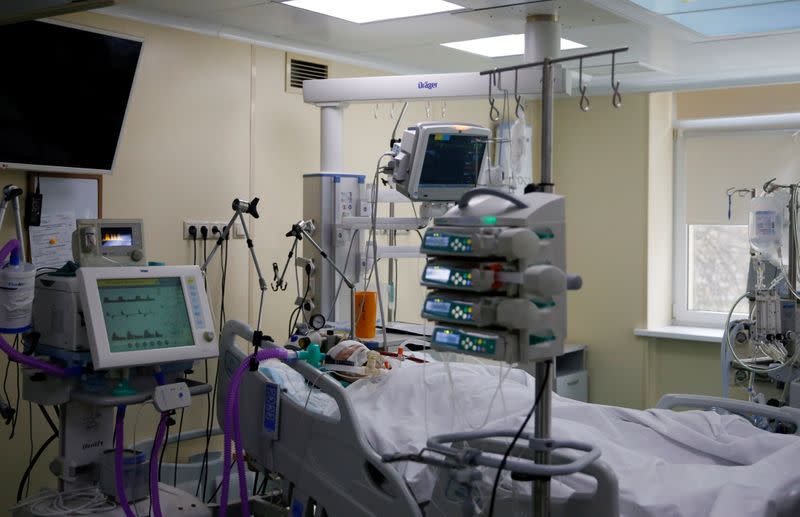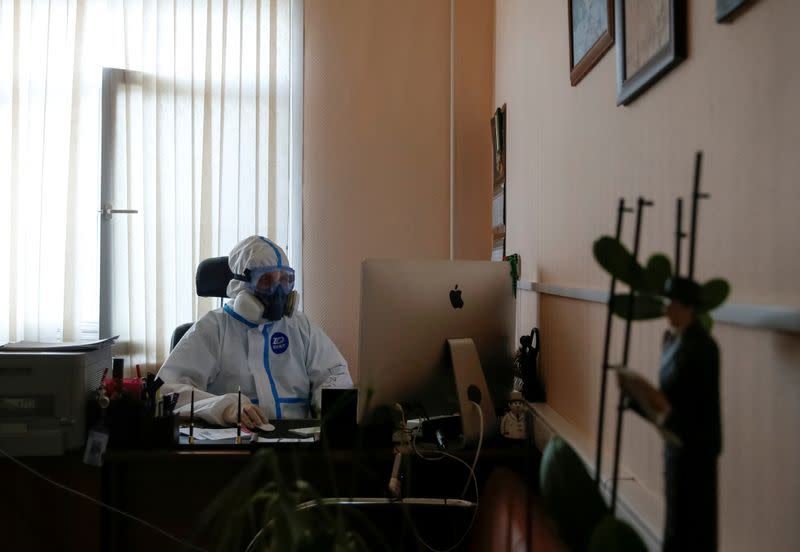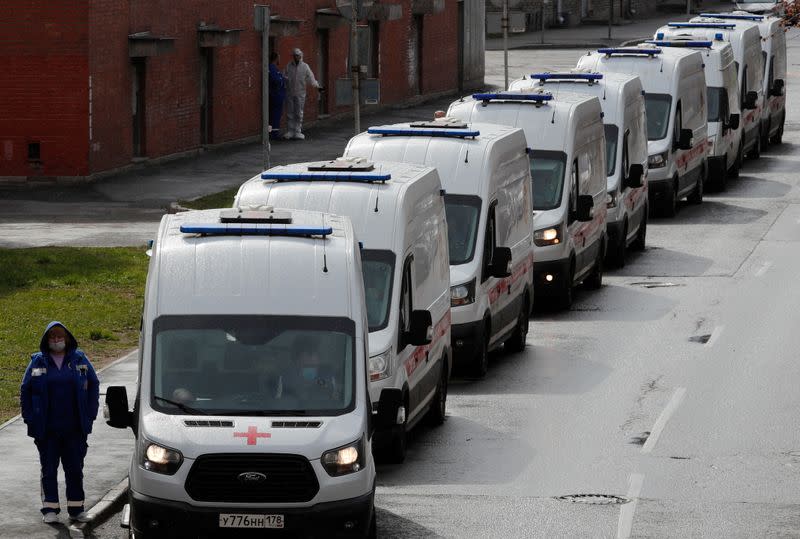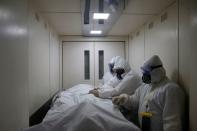Russia's ventilators: plentiful, but often old and sometimes broken
By Maria Tsvetkova, Polina Nikolskaya and Gleb Stolyarov
MOSCOW (Reuters) - As new cases of the coronavirus accelerate in Russia, by one measure it is relatively well placed to cope with the pandemic.
Russia has around 27 ventilators per 100,000 citizens, according to the government, considerably more than the 18.8 per 100,000 in the United States, according to the John Hopkins University.
But those numbers do not paint the whole picture.
Many ventilators in central regional or district hospitals, regarded as the core of the health system outside big cities, were made in the 1990s, data provided to Reuters by Headway Group, an analytics firm that tracks government tenders, show.
Such hospitals are often only equipped with five or six ventilators on average, it said. That estimate was based on data the company had compiled up to the beginning of 2019.
Older models lack the functionality of newer ones, including screens that give a full picture of a patient's breathing process, two Russian doctors said.
One of them, an emergency room doctor who regularly operates ventilators, complained that these machines cannot ventilate a patient's lungs for as long as new ones.
There were 145,268 confirmed coronavirus cases reported in Russia by Monday morning, with a record daily number confirmed on Sunday and a similar increase on Monday.
The overall death toll was 1,356, a significantly lower percentage than in many other countries.
More than half of all deaths and cases have been in Moscow, where the best medical resources are concentrated.
"In Moscow many (hospitals) may follow the best Western standards and in some regions little has changed since the 1990s or the late Soviet times," Alexander Baunov, senior fellow at the Carnegie Moscow Center think-tank, wrote on Twitter on May 3.
But as the spread of the virus through the rest of the world's biggest country by territory accelerates, the quality and number of ventilators will be increasingly important to keep the mortality rate down, several government officials say.
Four of eight regional governors who took part in a video conference with President Vladimir Putin on April 17 told him they did not have enough artificial lung ventilators.
Putin was personally involved, on a daily and sometimes hourly basis, with trying to solve ventilator shortages in the regions, Kremlin spokesman Dmitry Peskov told state TV in April.
"Factories are working three shifts," said Peskov. "But they're not coping with the number of orders."
Putin told the same meeting of regional governors that he was aware of difficulties sourcing equipment, including ventilators, and said the federal government was helping them with funds worth at least 86 billion roubles ($1.15 billion).
At least 17.7 billion roubles of that money had been earmarked for ventilators and other purchases, he said.
Eleven days later, Putin said Russia had successfully ramped up ventilator production. Only 60-70 a month were being made at the start of the year, Putin said, but that figure was over 800 in April and would be 2,500 in May.
Shortages persisted, however, he added.
On March 30, Putin said the quality as well as the quantity of ventilators was vital, and ordered a nationwide inventory which is underway.
Tatyana Revva, a doctor in the southern Volgograd region, released a video online in late March in which she complained about the ventilator situation in the hospital where she worked.
"We are not ready, we don't have anything," said Revva. "We have two ventilators and a third one which is broken, and the two that work are currently being used by sick patients."
Oleg Kumeiko, head doctor at her hospital, told reporters and police that Revva's accusations were "fake news" and that there were no shortages of anything.
Anastasia Vasilyeva, head of Russia's Doctor's Alliance trade union, which is in touch with Revva, said the broken ventilator she referred to was repaired in April after she spoke out.
FOREIGN PURCHASES MADE
With demand high, stocks of Russian-made ventilators are running low, three commercial sources and a hospital told Reuters. They are the primary source of new supply despite being regarded by some Russian medical professionals as inferior to foreign ones.
Those made abroad, meanwhile, are scarce as governments rush to snap up large quantities, and manufacturers say they cannot immediately supply everyone.
At least one organisation in Russia did manage to purchase ventilators from overseas in recent weeks, however, though it did not need them in the end.
Medtekhnika, a state-run unit that supplies medical equipment for Kremlin clinics that treat the country's political elite including Putin, bought three foreign artificial lung ventilators in March that can be used to help coronavirus patients, documents seen by Reuters show.
Sergei Savostyanov, a Communist lawmaker in the Moscow city parliament who sits on its healthcare commission, said the Kremlin unit's ventilator purchases were part of an entrenched two-tier health system which favoured the elite.
"I consider it wrong for officials and other lawmakers to be treated in specialised clinics separate from the health system which they created with their own decisions for the general population," Savostyanov told Reuters.
The Kremlin did not reply to a request for comment.
The March 19 purchase of one German and two U.S. ventilators was confirmed by the unit head, who said he wanted the equipment just in case there was demand related to the coronavirus in the clinics it supplies.
They included a German Lowenstein Medical VENTIlogic LS for 1.2 million roubles ($15,700), and two U.S.-made models, a Medtronic Puritan Bennett and an NPB-560, costing 950,000 roubles ($12,400) each, the government's database for state purchases shows.
The purchase does not breach international sanctions against Russia because they do not cover medical equipment.
Nadezhda Borodina, a representative for Lowenstein Medical, based in Germany's Rheinland Pfalz, said sales were handled by an exclusive distributor called Terapevt. Haidar Gufranov, the head of Terapevt, said his firm did not sell the ventilator to Medtekhnika.
Reuters was unable to independently establish the specifics of the deal.
Olga Kalinina, a representative for Medtronic, which is based in Minnesota, declined to discuss the U.S. machines purchase, saying the company's policy was not to comment on deliveries and orders. She did not name a possible distributor.
Oleg Nesterov, Medtekhnika's head, told Reuters that the three ventilators were stored in his office. He said he bought them from a distributor rather than from the manufacturers directly but could not recall its name.
"We bought these when it (coronavirus) all started for our institutions, but unfortunately they didn't need them," he said.
Given that it turned out that the ventilators were not wanted by the Kremlin clinics, he said they would be sold at a profit and that there was "considerable demand".
"We held them back for ourselves, for our institutions in the event of force majeure circumstances. If they'd been needed urgently we would have given priority to our own (Kremlin) clinics."
(Additional reporting by Andrew Osborn, Anastasia Lyrchikova, Anton Zverev, Polina Ivanova, Tatiana Voronova, Rinat Sagdiyev, Olesya Astakhova, Katya Golubkova and Polina Devit; Writing by Andrew Osborn; Editing by Mike Collett-White)










